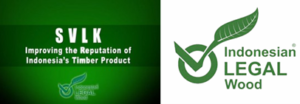SVLK is frequently referred to as a Timber Legality Verification system, standard, or certification. This certification ensures that wood products and their raw materials are generated from sources whose origin and management comply with legal requirements. Timber is considered lawful if it can be demonstrated that its origin, logging licenses, systems, and processes for harvesting, transporting, processing, trading, or transferring comply with all relevant laws. The SVLK is compiled by several parties, sometimes known as the parties. The SVLK includes agreed-upon standards, criteria, indicators, verifiers, verification procedures, and evaluation norms.

The Indonesian government implements the SVLK to assure the legality of all wood products in circulation and commerce in Indonesia. With SVLK, foreign buyers no longer need to question the legitimacy of Indonesian-origin wood. With SVLK, farmers from community forests and indigenous peoples may strengthen their negotiating position and transport timber without worrying about the legality of their timber products. The confidence of furniture producers in the legitimacy of the origin of their raw wood materials helps their ability to persuade foreign clients. Indonesia has introduced the SVLK through a series of incremental measures. Before proceeding to a certificate of sustainable forest management, a certificate of legality must first be shown (sustainability).
In addition, the SVLK is implemented to ensure the legality of Indonesian wood products on the international market. It is anticipated that this endeavor would boost the competitiveness of Indonesian wood products and minimize illicit logging and illegal commerce. Moreover, the SVLK signifies a commitment to significant and continuous efforts to strengthen forest governance in Indonesia. Improving governance, representation of the parties in system creation and monitoring (representativity), and openness (transparency) are the guiding concepts of SVLK, which is an open system for supervision by all stakeholders.
Multiple importing nations implement requirements to demonstrate the legality of all wood products in circulation, including those from imports. For instance, the United States (US) Government enforced the Lacey Act, the European Union (EU) Government enforced the Timber Regulation, Australia enforced the Illegal Logging Prohibition Act, and Japan implemented the Green Konyuho (GoHo Wood).
The legality of Wood Products in America and Europe


Since the Government of Indonesia released Minister of Forestry Regulation No. P.38/Menhut-II/2009 in June 2009, the SVLK has been in effect. MS Kaban, the then-Minister of Forestry, authorized and endorsed the parties’ request for Standards and Guidelines for the Implementation of Sustainable Forest Management Performance Assessment (PHPL) and Timber Legality Verification to become required (VLK). The SVLK continues to be modified with the modification of P.38/Menhut-II/2009 to become Minister of Forestry Regulation No. P.68/Menhut-II/2011 and the addition of the revisions of Permenhut Nos. P.45/Menhut-II/2012 and P.42/Menhut-II/2013. The desire for legal wood goods and resources is not new. SVLK is a necessary mechanism that ensures compliance with all Indonesian legislation governing the circulation and trading of wood. And for outbound trade/export licenses for wood goods, one of them demands the use of V-Legal (Verified Legal) Documents, following the Minister of Trade’s Regulation No. 64/M-DAG/PER/2012.